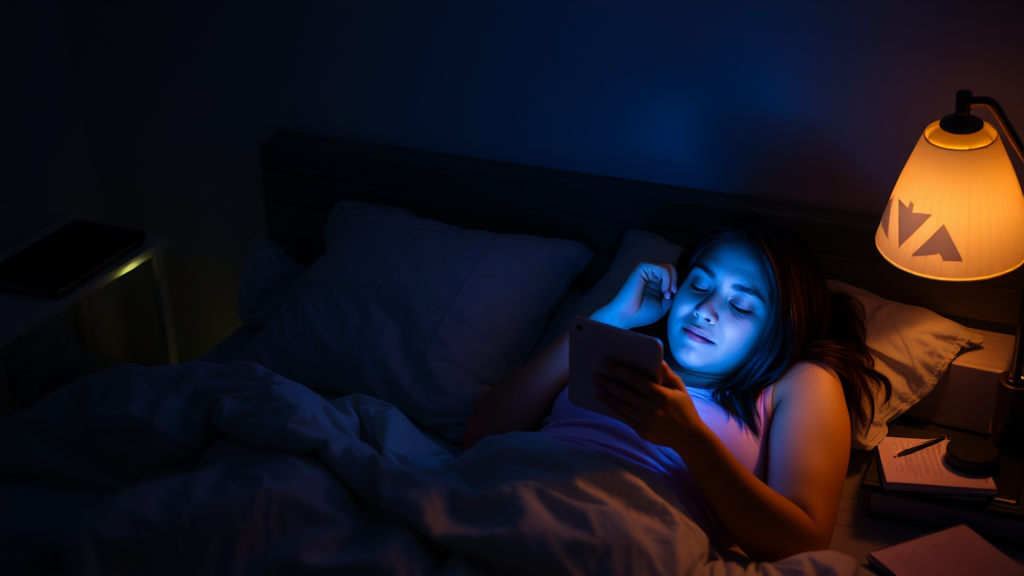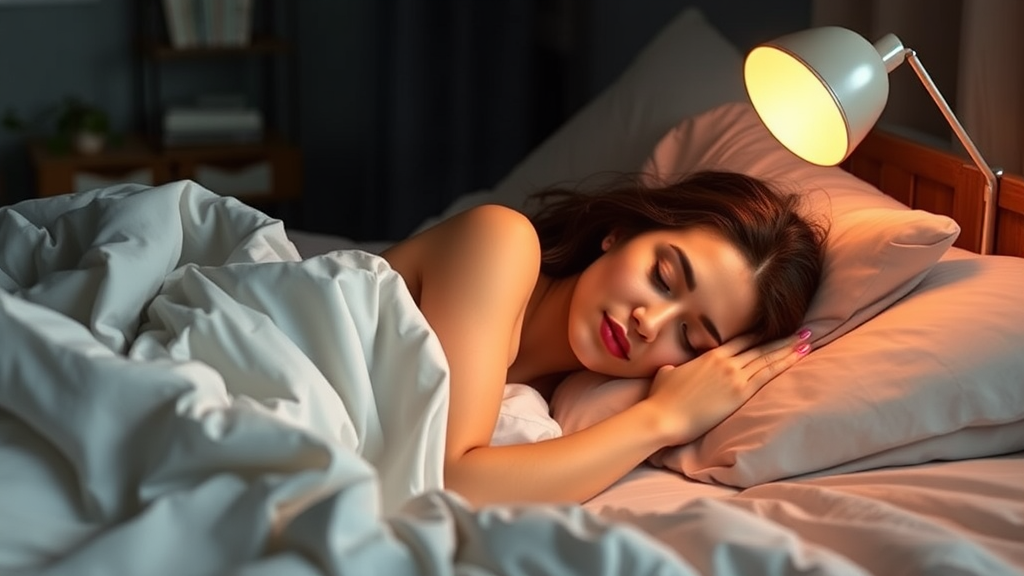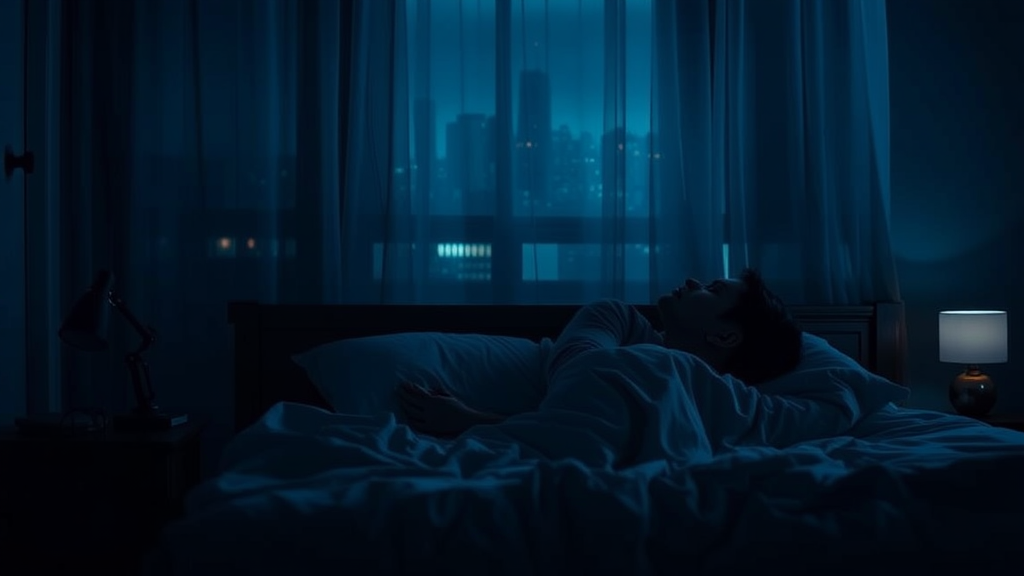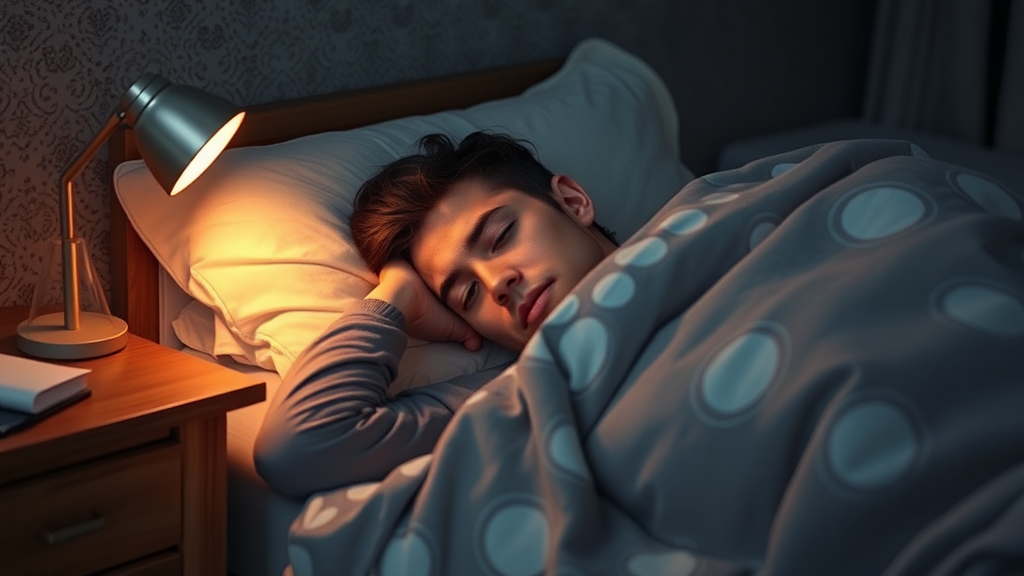The Impact of Blue Light on Sleep Quality and Insomnia
In today’s digital age, the prevalence of screens—from smartphones and tablets to laptops and televisions—has significantly increased. This trend has raised concerns about the potential negative effects of blue light exposure on sleep quality and insomnia. Understanding the impact of blue light on our sleep patterns is crucial for improving our overall well-being.
Blue light is emitted by electronic devices and has a short wavelength that can disrupt the body’s natural circadian rhythms. This disruption often leads to difficulty falling asleep and maintaining restful sleep. The human body relies on melatonin, a hormone responsible for regulating sleep, and blue light can inhibit its production. The exposure to blue light in the evening tricks the brain into thinking it’s still daytime, which can lead to prolonged alertness and challenges in winding down.
How Blue Light Affects Sleep Quality
Several mechanisms illustrate how blue light impacts sleep negatively:
- Inhibition of Melatonin Production: Blue light exposure in the evening reduces melatonin levels, making it harder for you to fall asleep.
- Disruption of Circadian Rhythms: Our circadian rhythm is the internal clock that tells us when to sleep and wake. Blue light can shift this clock, resulting in sleep disorders.
- Increased Alertness: Blue light stimulates the brain, making it more alert. If you’re using electronic devices before bed, your brain might take longer to relax.
Statistics on Blue Light and Sleep
Recent studies have highlighted the relationship between blue light and sleep disturbances. Here are some figures that showcase the issues:
| Study | Findings |
|---|---|
| Harvard Study (2015) | Participants who used devices emitting blue light took longer to fall asleep and experienced less REM sleep. |
| National Sleep Foundation Survey (2020) | 60% of respondents reported that screen time at night significantly interfered with their sleep quality. |
| American Academy of Sleep Medicine (2018) | 73% of adults who use electronic devices before bed report difficulty falling asleep. |
Practical Strategies to Reduce Blue Light Exposure
If you’re struggling with sleep issues related to blue light, consider implementing the following strategies:
- Establish a Screen Curfew: Try to avoid screens at least 1-2 hours before bedtime.
- Use Blue Light Filters: Many devices now come with settings that reduce blue light emission. Consider enabling these features.
- Utilize Night Mode: Apps and settings on smartphones can minimize blue light exposure. Use these to adjust your screen’s color temperature.
- Limit Environmental Light: Use dim lighting in your home during the evening. Soft yellow or red lights are less disruptive to melatonin production.
- Engage in Relaxing Activities: Instead of screen time, opt for reading a book, meditating, or doing gentle yoga.
Long-Term Benefits of Reducing Blue Light Exposure
By minimizing blue light exposure in the evening, you can significantly enhance your sleep quality. Here are some of the long-term benefits:
- Improved Sleep Quality: Better sleep leads to improved daily functioning and mood.
- More Energy: Reduced fatigue during the day enhances productivity.
- Better Overall Health: Quality sleep is linked to a lower risk of chronic diseases, including heart disease and obesity.
Understanding the impact of blue light on sleep quality and insomnia is vital for establishing better sleep habits. By incorporating practical strategies such as screen curfews and using blue light filters, you can significantly improve your sleep quality and overall health. Making these changes may take time, but the benefits are undoubtedly worth the effort.
Understanding the Science Behind Sleep Cycles
Sleep is a crucial part of our lives, influencing our health and well-being. Understanding how sleep cycles work can help you make better choices for restful nights. Generally, sleep occurs in cycles, with each cycle lasting about 90 minutes. During these cycles, different stages of sleep occur, each vital for different functions.
What Are Sleep Cycles?
Sleep cycles are made up of several stages, primarily categorized into two types: REM (Rapid Eye Movement) and non-REM sleep. These stages alternate throughout the night, typically following this pattern:
- Stage 1 (Light Sleep): This is a light sleep stage lasting several minutes where you drift in and out of sleep. Your muscles relax, and your heart rate slows.
- Stage 2 (Moderate Sleep): Your body temperature drops, and eye movement ceases. This stage lasts for about 20 minutes.
- Stage 3 (Deep Sleep): Also called slow-wave sleep, this stage is crucial for physical recovery and immune function. It’s harder to wake someone during this stage.
- Stage 4 (REM Sleep): This stage, characterized by vivid dreams, plays a significant role in memory consolidation and emotional regulation. Your brain becomes more active than in previous stages.
Why Sleep Cycles Matter
Each stage of the sleep cycle plays a unique role in ensuring you wake up feeling refreshed. The transitions between these stages help to maintain a balance of both physical and mental health. Here are some essential roles sleep cycles play:
- Physical Recovery: Stages 3 and 4 primarily help your body recover by repairing muscles and tissues.
- Brain Function: REM sleep enhances memory consolidation, learning, and creative problem-solving.
- Emotional Well-Being: Adequate REM sleep contributes to emotional balance and mood regulation.
How Sleep Cycles Are Affected
Many factors can disrupt your sleep cycles, including:
- Stress and Anxiety: High stress affects your ability to fall asleep quickly and can lead to fragmented sleep.
- Caffeine and Alcohol: Stimulants and depressants can disrupt the natural progression through sleep stages.
- Environment: Noise, temperature, and light can significantly impact how well you sleep.
Tips to Improve Sleep Cycles
Here are several strategies you can use to promote healthier sleep cycles:
- Establish a Routine: Going to bed and waking up at the same time daily can help regulate your internal clock.
- Create a Relaxing Environment: Ensure your bedroom is cool, dark, and quiet. Consider using blackout curtains and white noise machines.
- Limit Stimulants: Try to avoid caffeine and nicotine in the hours leading up to bedtime.
- Reduce Screen Time: Exposure to blue light from screens can impair melatonin production, making it harder to fall asleep.
Understanding Your Sleep Patterns
Listening to your body can provide insight into your sleep quality. Keeping a sleep diary may also help identify regular patterns and possible disruptions. Note the following:
- Duration: Track how many hours you sleep each night.
- Quality: Rate how rested you feel upon waking.
- Awakenings: Record any instances of waking during the night.
Understanding the science behind sleep cycles allows you to appreciate their importance for overall health. By adopting strategies to optimize your sleep, you can reduce disturbances and improve your well-being. Make small changes in your daily routine, and you may find that restful nights and refreshed mornings are within reach!
Practical Tips to Limit Screen Time Before Bed
Many people struggle with sleep, and one significant factor contributing to insomnia is screen time before bed. The blue light emitted by devices such as smartphones, tablets, and computers can interfere with your body’s natural sleep cycle. Reducing screen time can help you achieve better sleep quality. Here are some practical tips to help you limit your screen exposure as bedtime approaches.
Establish a Technology Curfew
Setting a specific time to put away your devices each night can create a positive routine.
- Choose a Cutoff Time: Aim to stop using screens at least one hour before bedtime. For example, if you plan to sleep at 10 PM, make your cutoff at 9 PM.
- Be Consistent: Stick to this routine every night, even on weekends. Consistency helps train your body to recognize bedtime.
Create a Relaxing Evening Routine
Calming activities into your evening can help reduce the urge to reach for your devices.
- Read a Book: Pick up a physical book or magazine instead of using a device. Reading can relax your mind and prepare you for sleep.
- Meditate: Practice mindfulness or meditation. Simple breathing exercises or using meditation apps can ease you into a more restful state.
- Take a Warm Bath: A warm bath or shower can signal your body that it’s time to relax and prepare for rest.
Use Screen Time Management Features
Many devices come with built-in tools to help users manage their usage. Utilize these features to support your goals.
- Screen Time Settings: Both iOS and Android have options to limit app usage. Set restrictions for entertainment apps in the evening.
- Night Shift Mode: Activate this feature, which reduces blue light exposure by changing the screen’s color temperature. While not a substitute for reducing screen use, it may help.
Designate a Charging Station Outside the Bedroom
Keeping devices out of the bedroom can help decrease temptation. Consider creating a tech-free zone.
- Set Up a Charging Area: Place chargers in another room, so you aren’t tempted to check your phone or tablet in bed.
- Use an Alarm Clock: Instead of relying on your phone as an alarm, invest in an old-fashioned alarm clock. This way, there’s no need to keep your phone nearby.
Engage in Sleep-Friendly Activities
Fill your evening time with activities that promote relaxation, reducing the desire for screen time.
- Light Stretching: Gentle stretches can help relax your muscles and unwind your mind.
- Journaling: Write about your day, jot down your thoughts, or note what you’re thankful for. It’s a great way to clear your mind.
- Listen to Music or Podcasts: If you still want some audio stimulation, opt for soothing music or calming podcasts that aren’t overly stimulating.
Be Mindful of Daytime Device Use
If you can reduce screen time during the day, you’ll likely feel less compelled to use devices at night.
- Set Daily Limits: Allocate specific blocks of time for social media or TV. By controlling usage during the day, you may find it easier to wind down at night.
- Take Screen Breaks: Perform the 20-20-20 rule: every 20 minutes, take a 20-second break by looking at something 20 feet away.
By employing these strategies, you can decrease your screen time effectively before bed, reducing the impact of blue light on your sleep. Better sleep may lead to improved mood, productivity, and overall well-being. Start today and take those first steps toward a more restful night!
The Benefits of Good Sleep Hygiene Practices
Getting quality sleep is essential for your overall well-being. Good sleep hygiene practices can help you achieve restful nights and energetic days. Let’s explore the benefits of establishing healthy sleep habits and how they can improve your life.
The Importance of a Consistent Sleep Schedule
One of the cornerstones of good sleep hygiene is maintaining a consistent sleep schedule. Going to bed and waking up at the same time every day, even on weekends, helps regulate your body’s internal clock. This leads to more restful sleep cycles. When your body knows what to expect, it can fall asleep and wake up easier, enhancing your mood and mental clarity.
Creating a Sleep-Inducing Environment
Your sleeping environment plays a crucial role in the quality of your sleep. Here are some key elements to consider:
- Comfortable Bedding: Invest in a quality mattress, pillows, and sheets. Comfort is key!
- Optimal Temperature: Keep your bedroom cool; a temperature between 60 to 67 degrees Fahrenheit is often recommended.
- Darkness: Use blackout curtains or sleep masks to block out light. Darkness triggers the release of melatonin, a hormone essential for sleep.
- Quiet: Minimize noise. Consider using earplugs or a white noise machine if you live in a noisy area.
The Role of Relaxation Techniques
Relaxation techniques into your bedtime routine can significantly enhance sleep quality. Here are a few methods you can try:
- Deep Breathing: Focus on your breath to calm your mind.
- Meditation: Reduces stress and anxiety, allowing for easier sleep onset.
- Progressive Muscle Relaxation: Tense and relax your muscles to release physical tension.
Limiting Stimulants and Distractions
What you consume and do before bed matters. Reduce or eliminate the following:
- Caffeine: Avoid caffeine in the afternoon and evening, as it can interfere with your ability to fall asleep.
- Nicotine: Like caffeine, nicotine is a stimulant that can disrupt sleep.
- Heavy Meals: Avoid large meals near bedtime, as they can cause discomfort and disrupt sleep.
Moreover, try to limit screen time at least an hour before bed. The blue light emitted by phones, tablets, and computers can confuse your body into thinking it’s still daytime, making it harder to fall asleep.
The Benefit of Physical Activity
Regular physical activity is not only great for your overall health, but it can also improve your sleep. Here are a few ways exercise can benefit sleep:
- Reduced Stress: Exercise helps manage stress and anxiety, allowing for better sleep.
- Increased Sleep Duration: People who exercise regularly report longer sleep durations.
- Enhanced Sleep Quality: Engaging in moderate aerobic exercise may significantly improve sleep quality.
Mindfulness and Mental Health
Mental well-being directly influences your sleep quality. Engaging in activities that promote mindfulness can lead to better sleep. Consider trying:
- Journaling: Writing down thoughts can clear your mind before sleep.
- Therapy: Speaking to a mental health professional can help address anxiety or depression that affects your sleep.
| Practice | Benefit |
|---|---|
| Consistent Sleep Schedule | Regulates internal clock |
| Comfortable Environment | Enhances comfort and relaxation |
| Relaxation Techniques | Reduces anxiety and promotes calmness |
| Physical Activity | Improves mental and physical health |
Integrating good sleep hygiene practices into your life can make a significant difference in how well you sleep. By making small changes regarding your environment, habits, and thoughts, you will find a noticeable improvement in your sleep quality. Remember, quality sleep doesn’t just happen; it’s cultivated through the right practices. Prioritize your sleep, and you’ll reap the benefits in your daily life.
Exploring Alternative Solutions for Better Sleep Management
Many people struggle with sleep management, often relying on sleep medications or quick fixes that don’t address the root causes of their insomnia. It’s important to explore a wide range of alternative solutions that can help improve sleep quality and make it easier for you to fall asleep naturally. Below, you will find various strategies that incorporate lifestyle changes, natural remedies, and mindfulness techniques to promote better sleep.
Establish a Sleep Routine
Creating a consistent sleep schedule is one of the most effective ways to improve your sleep quality. Here are some tips to help you establish a routine:
- Go to bed and wake up at the same time every day, even on weekends.
- Avoid long naps during the day, as they can disrupt your nighttime sleep.
- Engage in a relaxing bedtime routine to signal your body that it’s time to wind down.
Optimize Your Sleep Environment
Your sleep environment plays a significant role in how quickly you fall asleep and how well you stay asleep. Consider the following suggestions:
- Keep your bedroom cool, dark, and quiet to create an ideal sleeping atmosphere.
- Invest in a comfortable mattress and pillows that support your sleeping position.
- Limit exposure to bright lights and screens in the hour leading up to bedtime.
Incorporate Relaxation Techniques
Practicing relaxation techniques can help calm your mind and minimize stress, making it easier for you to sleep. Here are some popular methods:
- Deep Breathing: Focus on taking slow, deep breaths to relax your body and mind.
- Progressive Muscle Relaxation: Tense and relax each muscle group, starting from your toes and working your way up to your head.
- Mindfulness Meditation: Spend a few minutes focusing on your breath and letting go of the day’s thoughts.
Natural Remedies for Sleep
There are many natural remedies that can promote better sleep. Some options to consider include:
- Herbal Teas: Chamomile, valerian root, and passionflower are known for their calming effects.
- Essential Oils: Lavender oil can create a calming atmosphere when diffused in your bedroom.
- Magnesium Supplements: Magnesium can help relax the body and improve sleep quality.
Mind Your Diet
Your eating habits can significantly impact your sleep quality. Here are some dietary adjustments to consider:
- Avoid heavy meals, caffeine, and alcohol before bedtime.
- Incorporate foods rich in tryptophan, like turkey, nuts, and yogurt, into your diet.
- Stay hydrated, but reduce fluid intake an hour or two before bed to minimize nighttime trips to the bathroom.
Exercise Regularly
Regular physical activity can enhance sleep quality. Aim for at least 30 minutes of moderate exercise most days of the week, but try to avoid vigorous workouts close to bedtime. Activities such as walking, swimming, or yoga can be beneficial.
Limit Screen Time
Reducing screen time in the evening can significantly improve your sleep. Blue light emitted from devices can interfere with melatonin production, making it harder to fall asleep. To limit screen time:
- Set a digital curfew at least one hour before bedtime.
- Engage in screen-free activities such as reading a book, journaling, or practicing relaxation techniques.
- Consider using blue light filters or glasses if you must use devices late at night.
By taking these steps to explore alternative solutions for better sleep management, you can create a more peaceful night’s rest. It’s essential to find what works best for you since everyone’s body is different. With commitment and a proactive approach, you can enjoy restful nights and energetic days.
Conclusion
Achieving better sleep is crucial for your overall health and well-being, especially in our screen-saturated world. The impact of blue light on sleep quality is significant, as it can disrupt your natural sleep cycles and contribute to insomnia. By understanding the science behind sleep cycles, you can appreciate how vital it is to minimize exposure to blue light, especially in the hours leading up to bedtime.
Implementing practical tips to limit screen time—such as setting a digital curfew, using blue light filters, or engaging in calming pre-sleep routines—can promote healthier sleep patterns. Additionally, good sleep hygiene practices emphasize the importance of creating a restful environment. Simple adjustments like maintaining a dark, cool room and sticking to a consistent sleep schedule can make a world of difference.
Exploring alternative solutions for better sleep management, such as herbal supplements, meditation, or even cognitive behavioral therapy, provides further avenues to enhance your nightly rest. Remember, investing in better sleep is investing in your health. By recognizing the impact of blue light and committing to change, you take meaningful steps toward achieving deeper, more restorative sleep. Embrace these strategies, prioritize your sleep, and enjoy the benefits of waking up refreshed and ready to face each day.



